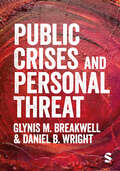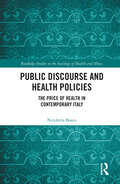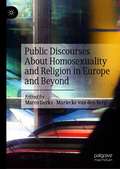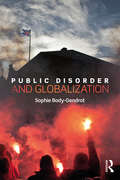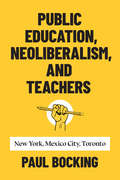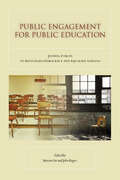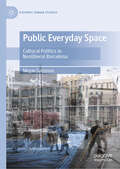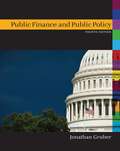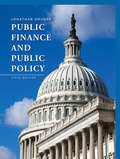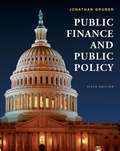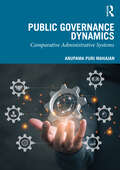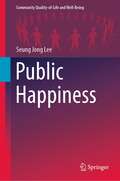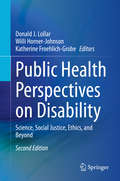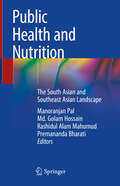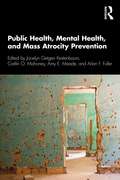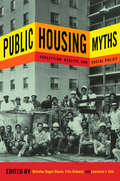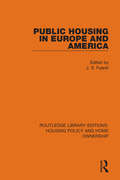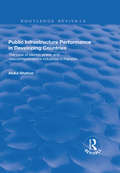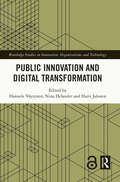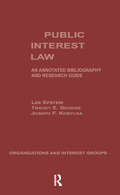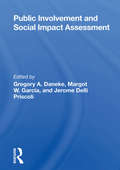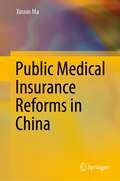- Table View
- List View
Public Crises and Personal Threat
by Glynis M. Breakwell Daniel B. WrightWith an emphasis on the practical, this book explains how people react to different sorts of crises, whether they be economic, environmental, health or war, and how we can better support the public, our families, and ourselves in future crises. The book interrogates how public crises are individualised, thought about, emotionally felt, and also mistrusted, all with a view to helping us understand some of the most difficult times we endure. Ideal for applied psychology students, public planning authorities and those specialising in crisis management this book will help us all to better understand the time we live in. Dame Glynis M. Breakwell is Professor Emeritus at the University of Bath in the Department of Psychology and has Visiting Professorships at Imperial College, London and the University of Surrey. Daniel B. Wright is Professor of Educational Assessment, in the Department of Educational Psychology and Higher Education, University of Nevada, Las Vegas.
Public Crises and Personal Threat
by Glynis M. Breakwell Daniel B. WrightWith an emphasis on the practical, this book explains how people react to different sorts of crises, whether they be economic, environmental, health or war, and how we can better support the public, our families, and ourselves in future crises. The book interrogates how public crises are individualised, thought about, emotionally felt, and also mistrusted, all with a view to helping us understand some of the most difficult times we endure. Ideal for applied psychology students, public planning authorities and those specialising in crisis management this book will help us all to better understand the time we live in. Dame Glynis M. Breakwell is Professor Emeritus at the University of Bath in the Department of Psychology and has Visiting Professorships at Imperial College, London and the University of Surrey. Daniel B. Wright is Professor of Educational Assessment, in the Department of Educational Psychology and Higher Education, University of Nevada, Las Vegas.
Public Discourse and Health Policies: The Price of Health in Contemporary Italy
by Nicoletta BoscoThe questions addressed in the book revolve around the public nature of health as an asset and the rights associated with it, by drawing attention to sociology’s role in shedding light on current dynamics and understanding how they may change in the future. In the field of public health, significant empirical evidence points not only to the outcomes, clinical and otherwise, that extensive information can produce but also to the urgent need to rethink the far from straightforward relationship between having this information and the ability to put it to effective use in tackling the problems it relates to. The book is intended for a broad audience of university researchers and students, particularly those involved in upper-level sociology and social policy programs. It will also be of interest to healthcare and social work policy-makers and practitioners who wish to gain a more detailed grasp of the dynamics of healthcare in order to approach its processes critically and improve their outcomes.
Public Discourses About Homosexuality and Religion in Europe and Beyond
by Marco Derks Mariecke van den BergThis volume addresses three things many people do not discuss candidly with strangers or mere acquaintances: God, sex, and politics. These can easily become topics of fierce debate, particularly when taken together, as has been the case with same-sex marriage legislation, the Vatican’s criticism of “gender ideology,” or the repeatedly asserted claim that Islam, homosexuality, and gender equality are essentially incompatible. This volume investigates what is at stake in these constructions of religion and homosexuality in public discourses. Starting with the Netherlands as a special case study, it proceeds with contributions on other predominantly postsecular countries in central, northern, and southern Europe as well as several postcommunist and postcolonial countries “beyond Europe.” Combining contemporary and historical perspectives and approaches from both the humanities and the social sciences, the contributors explore how national and European identities are constructed and contested in debates on religion and homosexuality.Chapter 2 and Chapter 8 of this book are available open access under a CC BY 4.0 license at link.springer.com.
Public Disorder and Globalization
by Sophie Body-GendrotThe current growth of incidents of public disorder around the world can be seen as symptomatic of major transformations in globalized society, government, and technology. But while disorder is routinely perceived as a disturbing phenomenon, it can also be a catalyst for positive transformation and regeneration. As social media is increasingly used as a platform for mobilization and organization, local disorder may spread outward through national borders, receiving international coverage and visibility as well as triggering a domino effect of global unrest. Combining qualitative and quantitative research, this ground-breaking text analyzes oppositional notions of order and disorder in global, national, and local contexts and considers the role of the police, the justice system, and other authorities in developing a range of responsive strategies. The author develops a new comprehensive framework for engaging in comparative and historical analysis of public disorder by drawing upon international case studies of public unrest such as 2005 in Paris and 2011 in London; the events in Ferguson and Baltimore that seeded Black Lives Matter; the Occupy movements in Zuccotti Park, Gezi Park, and Hong Kong; and the terror attacks in Paris and Brussels. This dynamic comparative study is informed by extensive international interviews and will be a required reading for students and scholars of criminology, sociology, political science, and urban studies.
Public Economics
by Gareth D. MylesThis textbook provides a thorough treatment of all the central topics in public economics. Aimed at senior undergraduate and graduate students, it will also be invaluable to professional economists and to those teaching in the field. The book is entirely self-contained, giving all the equilibrium theory and welfare economics needed to understand the analyses. The author covers the Arrow-Debreu economy, welfare economics and the measurement of inequality and poverty which lay the foundations and emphasise the important role played by information. Within the competitive economy, he examines commodity taxation, income taxation and tax reform in a certain environment. He goes on to study the public economics of uncertainty, and then treats public goods, externalities, imperfect competition and tax evasion as departures from the standard competitive assumptions and looks at their implication for public economics derived.
Public Education, Neoliberalism, and Teachers: New York, Mexico City, Toronto
by Paul BockingFrom pressure to "teach to the test" and the use of quantitative metrics to define education "quality," to the rise of "school choice" and the shift of principals from colleagues to managers, teachers in New York, Mexico City, and Toronto have experienced strikingly similar challenges to their professional autonomy. By visiting schools and meeting teachers, government officials, and union leaders, Paul Bocking identifies commonalities that are shaping how teachers’ work and public schools function. While arguing that neoliberal education policy is a dominant trend transcending the realities of school districts, states, or national governments, Bocking also demonstrates the importance of local context to explain variations in education governance, especially when understanding the role of resistance led by teachers’ unions.
Public Engagement for Public Education: Joining Forces to Revitalize Democracy and Equalize Schools
by John Rogers Marion OrrCommunity participation plays a large role in the success or failure of our public schools. This book focuses attention on the problem of inequality in public engagement, considering how race, class, ethnicity, language, and immigration status shape opportunities for engagement. Without the active participation of the public, chances for improving school systems are limited. Without equal opportunity for public engagement, those in the lower reaches of stratified society are left largely on the outside looking in-and that all too easily becomes a self-perpetuating cycle. Public Engagement for Public Educationspeaks to the potential for students, parents, community members, and civic leaders to join forces and create more equitable schooling. Such engagement can expand access to quality educational pathways which in turn paves the way to a stronger voice in society and the promise of the American dream. If segments of society are blocked access to those pathways, the book argues, nothing less than the health of American democracy is at stake.
Public Everyday Space: Cultural Politics in Neoliberal Barcelona (Hispanic Urban Studies)
by Megan SaltzmanThis book explores how everyday practices in public space (sitting, playing, walking, etc.) challenge the increase of top-down control in the global city. Public Everyday Space focuses on post-Olympic Barcelona—a time of unprecedented levels of gentrification, branding, mass tourism, and immigration. Drawing from examples observed in public spaces (streets, plazas, sidewalks, and empty lots), as well as in cultural representation (film, photography, literature), this book exposes the quiet agency of those excluded from urban decision-making but who nonetheless find ways to carve out spatial autonomy for themselves. Absent from the map or postcard, the quicksilver spatial phenomena documented in this book can make us rethink our definitions of culture, politics, inclusion, legality, architecture, urban planning, and public space.
Public Finance And Public Policy 4th Ed
by Jonathan GruberJonathan Gruber's groundbreaking Public Finance and Public Policy was the first textbook to truly reflect the way public policy is created, implement, and researched. Like no other text available, it integrated real-world empirical work and coverage of transfer programs and social insurance into the traditional topics of public finance. From its first edition, the book quickly became the market-leading text for Public Finance and Public Policy courses, and the margin is growing. Thoroughly updated, this timely new edition gives students the basic tools they need to understand the driving issues of public policy today, including healthcare, education, global climate change, entitlements, and more.
Public Finance and Public Policy
by Jonathan GruberJonathan Gruber's market-leading Public Finance and Public Policy was the first textbook to truly reflect the way public policy is created, implemented, and researched. Like no other text available, it integrated real-world empirical work and coverage of transfer programs and social insurance into the traditional topics of public finance. By augmenting the traditional approach of public finance texts with a true integration of theory, application, and evidence, Public Finance and Public Policy engages students like no other public finance text. Thoroughly updated, this timely new edition gives students the basic tools they need to understand the driving issues of public policy today, including healthcare, education, global climate change, entitlements, and more.
Public Finance and Public Policy
by Jonathan GruberWe are currently engaged in the most fundamental debate about the role of government in decades, and who better than Jonathan Gruber to guide students through the particulars in the new edition of his best-selling text, Public Finance and Public Policy, 6e. The new edition details ongoing policy debates, with special focus on the largest tax reform in 30 years. New topics include universal basic income, the legalization of pot, and congestion pricing. And, of course, there is an extensive, in-depth discussion of the debate over health care. At the heart of this new edition is the author's belief that at no other time has it been so important to know the facts, to distinguish facts from falsehoods, and to be thinking clearly about problem, policy, and politics. The sixth edition delivers on all counts.
Public Governance Dynamics: Comparative Administrative Systems
by Anupama Puri MahajanThis textbook examines public administration from a comparative perspective by incorporating theory and practice from two separate fields: Political Science and Development Administration. It explores the intricate interplay of diverse administrative frameworks, emphasising the adaptation and efficiency of governance models in varied political and cultural landscapes, especially in the selected five countries: the UK, the USA, France, Japan and India.This volume explores the evolution of comparative public administration and the approaches of F. W. Riggs, Ferrel Heady and John D. Montgomery to understand the major administrative systems around the world. It examines the extent to which the various forms of polities, regimes and public opinion can influence bureaucracies in multiple countries and analyses the role of public administration systems in their democratic frameworks.This book will be useful to students, researchers and teachers of Public Administration, Public Policy, Political Science and General Management. It will also be an invaluable companion to the policymakers in the government sector as it will strengthen their conceptual understanding of the subject.
Public Happiness (Community Quality-of-Life and Well-Being)
by Seung Jong LeeWe all strive for personal happiness in one way or another, but what about public happiness? What does public happiness mean and what role can governments and public policies play? The current COVID-19 pandemic has highlighted the inadequacies of old governance paradigms and even before this pandemic, increasing inequalities and frustration with the old GDP-centric growth paradigm have fueled dissatisfaction with and distrust of governments. This book suggests a new path towards public happiness as a potential solution. The book builds a theory of public happiness as a distinct concept from individual happiness, borrowing especially from Eastern philosophy. It provides an overview of the efforts so far to go “beyond GDP” – including measurement and exploration of the determinants of happiness – and how these efforts have fallen short of expectation. Lastly, the book sketches out what a public happiness policy might look like and identifies the factors of a successful happiness policy.
Public Health Perspectives on Disability: Science, Social Justice, Ethics, and Beyond
by Donald J. Lollar Willi Horner-Johnson Katherine Froehlich-GrobeIn this new edition, the editors and contributors update and expand on the educational framework that was introduced in the first edition for rethinking disability in public health study and practice and for attaining the competencies that should accompany this knowledge. The second edition highlights key areas of research that have emerged since the first edition was published. This edition includes new and updated chapters that have particular relevance for public health practice: Disability, Intersectionality, and Inequity: Life in the MarginsDisability and Health Programs: Emerging PartnersChildren with Special Healthcare NeedsDisasters and Disability: Rhetoric and RealityInter-relationship of Health Insurance and Employment for People with DisabilitiesPublic Health, Work, and DisabilityActions to Prepare a Competent Workforce Public Health Perspectives on Disability: Science, Social Justice, Ethics, and Beyond, 2nd Edition, is an essential resource for public health educators and practitioners as well as students in graduate schools of public health throughout the United States.
Public Health and Nutrition: The South Asian and Southeast Asian Landscape
by Manoranjan Pal Premananda Bharati Md. Golam Hossain Rashidul Alam MahumudThis book addresses the health status of both mothers and children, highlighting acute malnutrition through anthropometric indices such as weight-for-height, weight-for-age, height-for-age, and BMI. Divided into four sections, it provides an overview of public health and nutrition, presents the state-of-the-art situation in South and South-east Asia, and analyzes real-life data on public health and nutrition not only from India and Bangladesh but also from other countries in South and South-east Asia. The book covers insightful analyses of child nutrition, maternal health, and socioeconomic factors, with an emphasis on maternal empowerment, health-seeking behavior, and healthcare accessibility in diverse contexts. The book also addresses topics such as identification of potential genes for prostate cancer, and quality of life and living arrangements of ageing population. The book is relevant for researchers in the fields of biostatistics, anthropology, demography, health, medicine, and planning, interested in understanding public health and nutrition in South Asia, especially in India and Bangladesh.
Public Health, Mental Health, and Mass Atrocity Prevention
by Jocelyn Getgen Kestenbaum Caitlin Mahoney Amy Meade Arlan FullerThis multidisciplinary volume considers the role of both public health and mental health policies and practices in the prevention of mass atrocity, including war crimes, crimes against humanity, and genocide. The authors address atrocity prevention through the framework of primary (pre-conflict), secondary (mid-conflict), and tertiary (post-conflict) settings. They examine the ways in which public health and mental health scholars and practitioners currently orient their research and interventions and the ways in which we can adapt frameworks, methods, tools, and practice toward a more sophisticated and truly interdisciplinary understanding and application of atrocity prevention. The book brings together diverse fields of study by global north and global south authors in diverse contexts. It culminates in a narrative that demonstrates the state of the current fields on intersecting themes within public health, mental health, and mass atrocity prevention and the future potential directions in which these intersections could go. Such discussions will serve to influence both policy makers and practitioners in these fields toward developing, adapting, and testing frames and tools for atrocity prevention. Multidisciplinary perspectives are represented among editors and authors, including law, political science, international studies, public health, mental health, philosophy, clinical psychology, social psychology, history, and peace studies.
Public Housing Myths: Perception, Reality, and Social Policy
by Nicholas Dagen Bloom Lawrence J. Vale Fritz UmbachPopular opinion holds that public housing is a failure; so what more needs to be said about seventy-five years of dashed hopes and destructive policies? Over the past decade, however, historians and social scientists have quietly exploded the common wisdom about public housing. Public Housing Myths pulls together these fresh perspectives and unexpected findings into a single volume to provide an updated, panoramic view of public housing.With eleven chapters by prominent scholars, the collection not only covers a groundbreaking range of public housing issues transnationally but also does so in a revisionist and provocative manner. With students in mind, Public Housing Myths is organized thematically around popular preconceptions and myths about the policies surrounding big city public housing, the places themselves, and the people who call them home. The authors challenge narratives of inevitable decline, architectural determinism, and rampant criminality that have shaped earlier accounts and still dominate public perception.Contributors: Nicholas Dagen Bloom, New York Institute of Technology; Yonah Freemark, Chicago Metropolitan Planning Council; Alexander Gerould, San Francisco State University; Joseph Heathcott, The New School; D. Bradford Hunt, Roosevelt University; Nancy Kwak, University of California, San Diego; Lisa Levenstein, University of North Carolina at Greensboro; Fritz Umbach, John Jay College of Criminal Justice, CUNY; Florian Urban, Glasgow School of Art; Lawrence J. Vale, Massachusetts Institute of Technology; Rhonda Y. Williams, Case Western Reserve University
Public Housing in Europe and America
by J. S. FuerstOriginally published in 1974, this book surveys the experience of public and quasi public housing in the UK, USA, France, Germany, the former USSR, Israel, Denmark, Sweden, Hungary and Puerto Rico. Each country’s housing policy is set in a broad social and historical context, showing how the policy developed and how effective it was. Administrative problems encountered in different countries are evaluated and compared and many similarities emerge. The relationship of housing to transport, education and employment is discussed and special attention is focused on the role of new towns in Sweden, the former USSR, the UK, Israel and the USA.
Public Infrastructure Performance in Developing Countries (Routledge Revivals)
by Abdul GhafoorThis title was first published in 2000: An investigation of the performance of the electric power and telecommunication sectors of Pakistan at the firm level as well as the sector as a whole, seeking to identify and quantify the extent of inefficiencies. Since physical or financial or productivity indicators alone are not able to explain the duality of public infrastructure purposes, the financial and productivity indicators have been used in evaluating the performance of these sectors. Further, a Cobb-Douglas production function has also been used to calculate the trend in the growth of total factor productivity. Economies of scale have also been studied in the case of electric power generation. The results of the study show that in Pakistan one of the usual motives for privatization (to avoid the poor financial results of state enterprises) is not relevant for electricity and telecommunications enterprises. This, however, appears to be due to the financial subsidies they received, through access to low cost loan finance and grants, rather than to their efficiency in operations. By the economic criteria of growth of TFP none of the enterprises do well and two have a negative TFP growth. The case for reforming these enterprises is strong and alternative modes of organization, finance and ownership need to be considered.
Public Innovation and Digital Transformation (Routledge Studies in Innovation, Organizations and Technology)
by Nina Helander Hannele Väyrynen Harri JalonenPublic innovation and digitalization are reshaping organizations and society in various ways and within multiple fields, as innovations are essential in transforming our world and addressing global sustainability and development challenges. This book addresses the fascinating relationship of these two contemporary topics and explores the role of digital transformation in promoting public innovation. This edited collection includes examples of innovations that emerge suddenly, practices for processing innovations, and the requirements for transformation from innovation to the "new normal". Acknowledging that public innovation refers to the development and realization of new and creative ideas that challenge conventional wisdom and disrupt the established practices within a specific context, expert contributions from international scholars explore and illustrate the various activities that are happening in the world of multiple digitalization opportunities. The content covers public administration, technical and business management, human, social, and future sciences, paying attention to the interaction between public and private sectors to utilize digitalization in order to facilitate public innovation. This timely book will be of interest to researchers, academics and students in the fields of technology and innovation management, as well as knowledge management, public service management and administration.
Public Interest Law: An Annotated Bibliography & Research Guide (Organizations and Interest Groups)
by Lee Epstein Joseph F. Kobylka Tracey E. GeorgeThis volume convincingly lays to rest two held beliefs that have long impeded scholarly analysis of the role of courts and litigation in American politics: 1) that group resort to the courts is a rather recent phenomenon resulting from actions of the Warren Court and the Civil Rights Movement; and 2) that unique and distinctive features of the judiciary somehow place it beyond or outside analytic frameworks used to study and analyze the role, nature and functioning of other governing institutions such as the Congress and the presidency. The title of the volume ~ Public Interest Law Sourcebook -- accurately describes its central purpose and method as descriptive and informative.
Public Involvement And Social Impact Assessment
by Gregory Daneke Jerome Delli Priscoli Margot GarciaThe participation of the public sector in assessing the socialimpact of a wide range of projects is the focus of this ground-breakingbook. Leading experts from the u.s. and canada have contributedoriginal articles based on their empirical research conducted in currentimpact situations. These are supplemented by the editors' analyticaloverviews. The book concludes with projections regardingfuture linkages between public involvement and social impact assessment.Dr. Gregory A. Daneke is associate professor of public affairsand business administration at Arizona State University. He has coeditedEnergy Policy and Public Administration (1980) and coauthoredPerformance Administration: Improved Responsiveness and Effectivenessin Public services (1980). Dr. Margot w. Garcia is a program analystwith the USDA Forest Service; as part of a .nationwide training programfor the Forest Service in land management planning, she taught publicinvolvement and land management planning. Dr. Jerome Delli Priscoliis senior policy analyst at the Institute for Water Resources, u.s.Army Corps of Engineers, Ft. Belvoir, Virginia.
Public Justice and the Anthropology of Law
by Ronald Niezen"In this powerful, timely study Ronald Niezen examines the processes by which cultural concepts are conceived and collective rights are defended in international law. Niezen argues that cultivating support on behalf of those experiencing human rights violations often calls for strategic representations of injustice and suffering to distant audiences. The positive impulse behind public responses to political abuse can be found in the satisfaction of justice done. But the fact that oppressed peoples and their supporters from around the world are competing for public attention is actually a profound source of global difference, stemming from differential capacities to appeal to a remote, unknown public. Niezen's discussion of the impact of public opinion on law provides fresh insights into the importance of legally-constructed identity and the changing pathways through which it is being shaped - crucial issues for all those with an interest in anthropology, politics and human rights law"--
Public Medical Insurance Reforms in China
by Xinxin MaThis book investigates public medical insurance reform in China and studies its effects from both institutional and empirical study perspectives. It provides the reader with academic evidence for understanding the transformation of public medical insurance and its effect on the utilization of healthcare services, expenditure for medical care, individuals’ financial portfolio allocation, and well-being. The main content of the book comprises two parts. First, institutional transformations of public medical insurance are considered: medical insurance reform in rural and urban China, and problems of medical insurance reform in the country. Second, it looks at the impact of public medical insurance reforms in China: evidence-based on empirical studies, including determinants of participation in medical insurance, the New Rural Cooperative Medical Scheme and its effects on the utilization of healthcare services, medical insurance and its effects on out-of-pocket expenditure, risky financial market participation, and well-being in China. This study provides academic evidence about these issues based on economic theories and econometric methods using many kinds of nationwide Chinese representative survey data. The book is highly recommended to readers who are interested in up-to-date and in-depth empirical studies on the mechanisms of participation in medical insurance and the impact of public medical insurance reforms on individuals and household behaviors in China. This volume will be of interest to those who are interested in the Chinese economy, social security policymakers, and scholars with an econometric analysis background.
